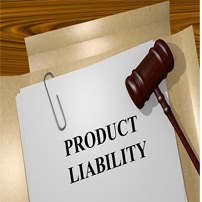Manufacturers of Defective Products Should Continue to be Judged by the Restatement (Second) of Torts
October 23, 2013For the past several years, some district courts and the Third Circuit have claimed confusion and uncertainty regarding products liability law in Pennsylvania. To address this confusion and uncertainty, the Pennsylvania Supreme Court granted allocatur to decide whether the Restatement (Second) of Torts or Restatement (Third) of Torts should be the substantive product liability law in Pennsylvania (Tincher v. Omega Flex, 60 A. 3d 860 – Pa: Superior Court 2012). In agreeing to hear Tincher, the Pennsylvania Supreme Court will be re-evaluating a decision based on sound social policy. This decision, made in 1966 by a unanimous Pennsylvania Supreme Court, adopted the Restatement (Second) of Torts as the substantive law to be applied for all product liability lawsuits filed in Pennsylvania. Webb v. Zern, 422 Pa. 424 (1966). Since Webb, every state court, without exception, has continued to apply the Restatement (Second) of Torts.
When the Webb court adopted Restatement (Second) of Torts, it recognized that consumers and equipment and machinery operators and users did not stand on equal footing with manufacturers of products. In designing and manufacturing products, which were being sold for profit, manufacturers were held to a higher standard than ordinary claims of negligence. Manufacturers were held to be the guarantors of the safety of their products. Consequently, manufacturers were charged with the legal responsibility of designing and manufacturing products equipped with safety devices and safeguards that were needed to make their equipment safe for their intended and expected uses. By applying the Restatement (Second) of Torts, manufacturers were held accountable for defective and unsafe products.
Knowing that product users may make a mistake in operating and using equipment and machinery, manufacturers began to consider human failure as one of the variables in attempting to design a safe product. Manufacturers could no longer disavow legal responsibility by claiming that the accident was the fault of the injured worker because of careless operation of the machinery or equipment. The Restatement (Second) of Torts held manufacturers and equipment suppliers strictly liable. It was the product and its design that were on trial. If a jury found a product defective, then an injured worker met his or her burden that the product was unreasonably dangerous. The equation “defective product = strict liability” provided justice to injury victims of unsafe products. This has been the law that has protected injured workers for the last forty-seven years.
Our Pennsylvania Supreme Court should not change long standing precedent that is based on fundamentally sound social policy. Application of the Restatement (Third) of Torts will destroy the rights of injury victims in product liability cases. It will allow manufacturers to dilute their legal responsibilities and shift the burden to those injured by defective products. Manufacturers are sophisticated businesses employing professional engineers to develop and design their products. These manufacturers clearly have superior knowledge, skill and experience with the products that are being sold as opposed to product users who lack the same level of sophistication, experience and skill.
Product suppliers should not enjoy a “mulligan” in designing and manufacturing equipment and machinery that has the potential for serious injury. The Restatement (Third) of Torts is nothing more than a watered down reasonable care standard. Absent historical evidence of prior lawsuits, product suppliers will avoid legal accountability simply by claiming that they acted “carefully” when they designed and manufactured the dangerous machinery and equipment and that the accident would not have occurred if the equipment was being “carefully” operated or used.
On at least two occasions the Third Circuit has crafted confusion by suggesting that it was not clear to it and the federal bench the state of Pennsylvania’s product liability law. In doing so, the Third Circuit has attempted to undermine forty-seven years of social policy intended to protect product users. Our Pennsylvania Supreme Court should not take the bait and turn its back on hundreds of state appellate decisions, including dozens of its own, which uphold the application of Restatement (Second) of Torts as the guiding law in the Commonwealth of Pennsylvania.
The Products Liability Lawyers at Galfand Berger: Knowledgeable Litigators Willing to Take a Stand to Protect Our Clients’ Rights
With decades of litigation experience and a proven track record of multi-million dollar verdicts and settlements, the Philadelphia products liability lawyers at Galfand Berger are recognized as leaders in this area of law. We understand the complexities of products liability lawsuits and fight aggressively to protect our clients’ rights and obtain the maximum recovery for their injuries. If you or a loved one has been injured by defective or unsafe machinery or equipment, call Galfand Berger today at 1-800-222-USWA (8792) to schedule a free consultation or submit a free online inquiry.
 Google Screened
Google Screened

 By
By